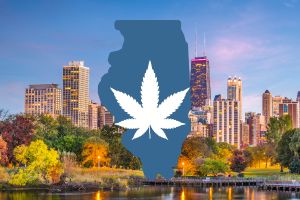Is CBD Flower Legal in Illinois?
Posted by Tweedle Farms on Feb 4th 2021

Hemp in Illinois: A Comprehensive Guide for Industry Insiders and Enthusiasts
In the heart of the Midwest, Illinois has emerged as a key player in the evolving landscape of hemp cultivation and production, reflecting a broader national movement towards embracing this versatile and historically significant crop. This article delves into the intricacies of hemp's legal status in Illinois, with a particular focus on CBD flower, shedding light on the implications for both industry stakeholders and consumers.
Historical Overview and Legislative Milestones
The journey of hemp in Illinois mirrors the broader narrative of hemp in America, marked by prohibition, resurgence, and legal reformation. The state's hemp industry began to take shape following the 2014 Federal Farm Bill, which opened the door for state-level pilot programs for hemp research. Illinois was quick to respond, establishing its own framework to explore the agricultural and economic potential of hemp.
The 2018 Federal Farm Bill was a watershed moment, removing hemp from the Controlled Substances Act, provided it contained less than 0.3% THC by dry weight. This pivotal legislation distinguished hemp from marijuana based on THC content, setting the stage for the expansion of the hemp industry nationwide.
Illinois' Response to Federal Legislation
Illinois aligned its state laws with the federal shift through the Illinois Industrial Hemp Act, which laid the groundwork for the cultivation, processing, and distribution of hemp within the state. The Illinois Department of Agriculture (IDOA) is at the forefront of regulating the hemp industry, ensuring compliance with state and federal laws while supporting the growth of this nascent sector.
Unpacking Hemp Flower, CBD Flower, and THCA Flower
The term "hemp flower" refers to the bloom of the hemp plant, characterized by low THC and high cannabinoid content. Hemp flower is often processed into other hemp-derived products, such as CBD oils, gummies, and more. CBD flower, on the other hand, is specifically bred for high cannabidiol (CBD) concentrations, attracting those seeking an experience similar to THC-rich cannabis, but without the psychoactivity.
THCA flower introduces an interesting legal discussion. As the non-psychoactive precursor to THC, THCA converts to THC upon decarboxylation, a process involving heat. Therefore, THCA flower’s “legality” is tenuous, at best.
Stakeholder Dynamics in Illinois
For farmers and cultivators in Illinois, adhering to the regulatory framework is paramount. This includes obtaining the necessary licenses, undergoing crop testing, and adhering to reporting protocols. The IDOA provides essential resources and guidance, facilitating a supportive environment for hemp agriculture.
Processors, manufacturers, and retailers navigating the hemp-derived product market must also contend with regulatory challenges, particularly concerning the marketing and sale of CBD products. The evolving stance of the FDA on CBD, especially in food and supplements, requires vigilant compliance with labeling and advertising regulations.
Consumer Perspectives
Illinois consumers are met with a diverse array of hemp-based products, from edibles like CBD gummies and gummies, to CBD oils, to smokable products like pre rolls or raw hemp flower. However, the regulatory landscape surrounding these products, particularly those containing CBD, remains in flux, emphasizing the importance of informed decision-making based on accurate labeling and product testing.
Legal Challenges and Advocacy Efforts
Despite significant progress, the Illinois hemp industry faces ongoing legal and regulatory hurdles. The ambiguous status of certain hemp-derived compounds and the need for clearer guidelines on CBD products are among the pressing issues confronting stakeholders.
Advocacy plays a crucial role in shaping the future of the hemp industry in Illinois. Organizations and coalitions dedicated to hemp advocacy work tirelessly to promote legislative clarity, support research initiatives, and foster public education on the benefits and challenges of hemp cultivation and consumption.
Future Outlook
The hemp industry in Illinois is at a crossroads, with immense potential for growth tempered by regulatory uncertainties. Continued research into hemp and its compounds, coupled with legislative and regulatory developments, will be instrumental in defining the path forward.
For industry stakeholders and consumers alike, staying abreast of legal and regulatory updates is essential. The sustainable development of the hemp industry in Illinois hinges on a collaborative effort among farmers, businesses, regulators, and consumers, aimed at harnessing the full potential of hemp while ensuring public safety and compliance with the law.
Conclusion
The legal and regulatory landscape of hemp in Illinois encapsulates the broader challenges and opportunities facing the hemp industry in the United States. From cultivation and processing to marketing and consumption, the journey of CBD flower through Illinois' legal framework highlights the complex interplay between agriculture, industry, and regulation. As the state continues to navigate these complexities, the collective efforts of all stakeholders will be pivotal in realizing the full promise of hemp as a sustainable and valuable crop.



